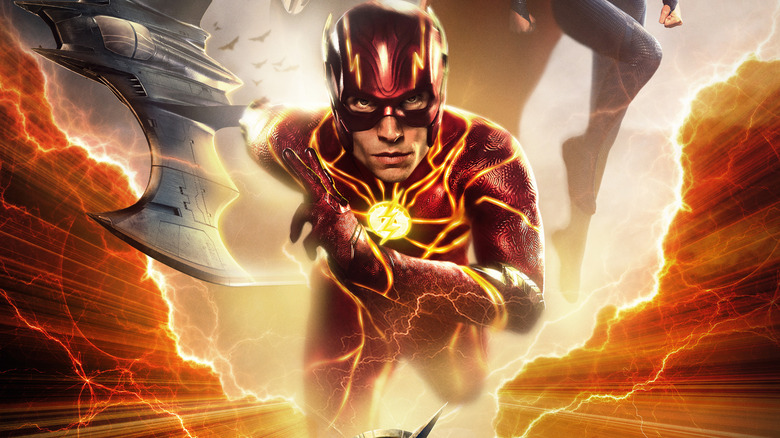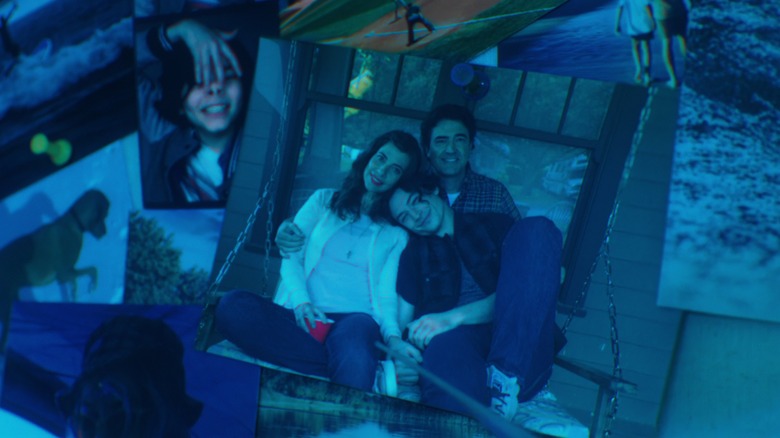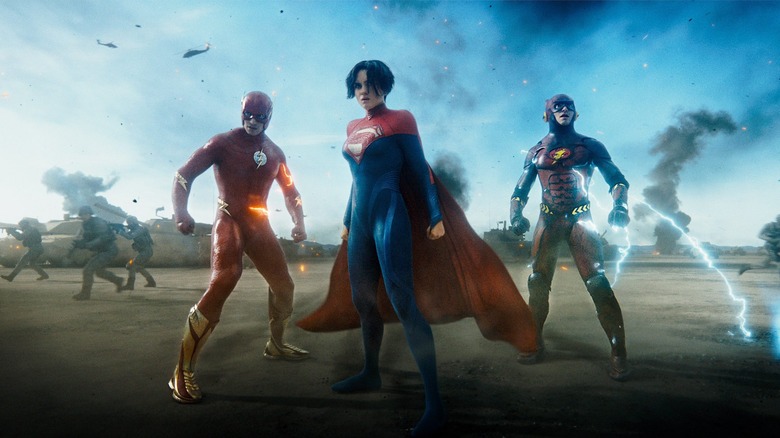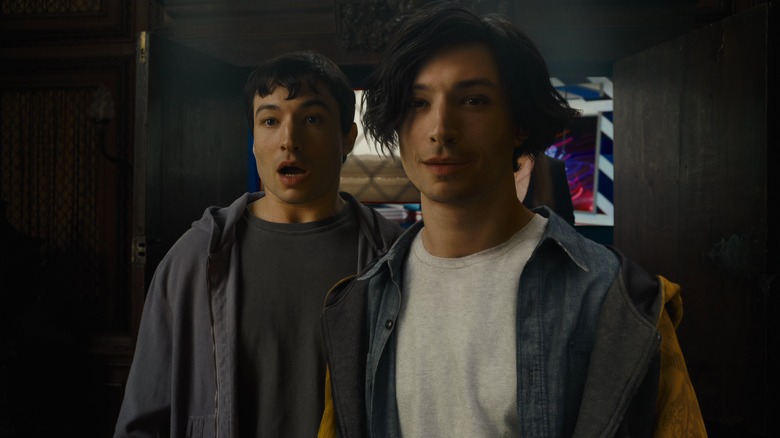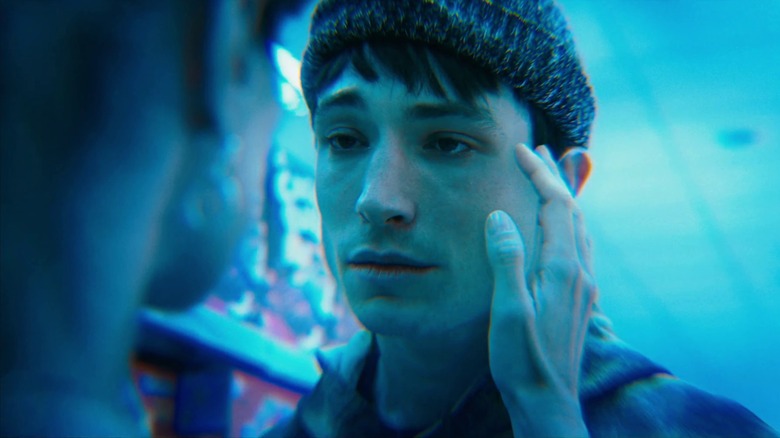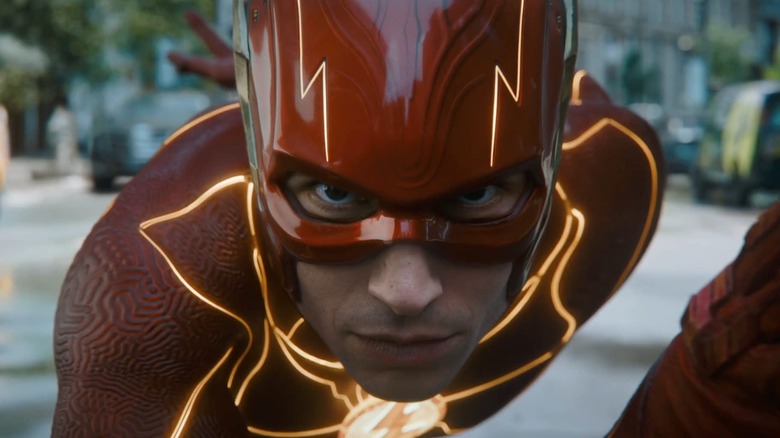The Flash Ending Explained: You Can't Always Get What You Want
Major spoilers follow.
For as long as sci-fi has existed as a genre, writers have wrestled with the cautionary tale of what might happen if certain individuals somehow were gifted the power to go back and change the past. Well over a century after H.G. Wells first published "The Time Machine," generally regarded as the story that popularized the very term "time travel" in the first place, we're still creating stories about the dangerous potential of the most human of all emotions: regret. While the past few years alone have seen an influx in time-travel movies like "Looper," "Edge of Tomorrow," and "Tenet," the recent multiverse craze has introduced a new spin on the old concept. Now, "The Flash" joins a crowded field that includes the likes of "Avengers: Infinity War" and "Avengers: Endgame," "Spider-Man: Across the Spider-Verse," and even a major upcoming blockbuster or two.
None, however, feature quite the twists and turns — both in front of and behind the camera — as "The Flash" does. Director Andy Muschietti inherited a profoundly troubled production that, in an alternate universe, would've debuted years ago. Instead, fans have had to wait until today for this long-delayed superhero movie to finally become a reality.
Was the wait worth it? /Film's Ben Pearson reviewed the film and called it, "...a funny, emotional, action-heavy crowd-pleaser that ranks among the best DC movies ever made." Reactions have turned decidedly mixed in the time since the film first premiered to rave reviews out of this year's CinemaCon event, but moviegoers have finally begun to experience the multiverse mayhem on the big screen for themselves. Controversial cameos, a crossover for the ages, a genuine emotional center, and an absolute bonanza of a climax all add up to a once-of-a-kind experience. Let's dig into the ending of "The Flash."
What you need to remember about the plot of The Flash
Let's just say that "The Flash" needed every second of its nearly two-and-a-half-hour runtime. Audiences would be forgiven for losing track of some of the plot for this latest superhero movie along the way, but thankfully the broad strokes aren't terribly difficult to follow. The story picks up in a post-"Justice League" world where the DC heroes, first established by director Zack Snyder in the previous movies, are now figures of renown who routinely save the day.
After the opening set piece involving a collapsing Gotham City hospital is resolved by the trio of Barry Allen, Batman (Ben Affleck), and the surprise appearance of Wonder Woman (Gal Gadot), the film quickly pivots to Barry's childhood trauma stemming from the death of his mother Nora (Maribel Verdú) and the wrongful imprisonment of his father and main murder suspect Henry (Ron Livingston). Unable to let go of the notion that he should be able to fix the past through his superpowers, Barry stumbles into a potential solution when he travels fast enough to enter the Speed Force and finds himself in an impossibly strange world that he calls the "Chrono Bowl." Confronted by memories of his past and discovering that he can actually enter those past events at will, he ignores the warnings of Bruce and goes about messing with history anyway — ensuring that his mother isn't murdered, his father isn't framed for the death, and that his younger self grows up with a complete family unit.
Of course, Barry's actions have wide-ranging ramifications. Thrown out of the Speed Force by some hideous and unknown entity, Barry is trapped in a timeline with his younger self that no longer has any superheroes to protect them.
What happened at the end of The Flash?
Nobody can save the world on their own — or undo their own mistakes without a little help, either. Trapped in an alternate universe with his younger and much less experienced self, Barry recognizes the need for a makeshift Justice League upon changing the timeline so badly that the invasion of the Kryptonian General Zod (Michael Shannon), as depicted in Zack Snyder's "Man of Steel" in 2013, now takes place without the benefit of Superman to stop him. Having regained his lost powers through some nifty lightning-induced improvising, Barry teams up with the brand-new Supergirl (Sasha Calle) and this timeline's version of Batman (a returning Michael Keaton from the Tim Burton "Batman" movies) to stop the destruction of this world at all costs.
Things, of course, go disastrously wrong. No matter how hard both Barry Allens try, Supergirl and Batman both end up dead with all hope lost. Finally recognizing the futility of their efforts, both Barrys decide to use the Chrono Bowl once again as a shortcut to undo the past. But with every failed attempt, things only get worse. Notably, fans are introduced to the idea that Barry's continued tampering is having a domino effect on the multiverse as a whole. In one of the movie's riskiest choices, viewers watch a parade of beloved characters from previous movies and shows — digital recreations of Christopher Reeves' Superman and Helen Slater's Supergirl, Adam West's Batman, both Teddy Sears' Flash and George Reeves' Superman, a tease of Nicolas Cage's aborted "Superman Lives" movie, and more — whose respective worlds will all be destroyed.
Here, things finally come to a head. 2013-era Barry realizes that the mysterious, scarred being opposing them is actually himself. And, tragically, there's only one way to defeat him.
What the final sacrifice in The Flash means
Sometimes, we can even surprise ourselves. After spending much of the movie failing to understand the gravity of the situation and constantly making light of everything, 2013 Barry sobers up and recognizes just how dire things have become. Unable to stomach seeing his newfound super-friends come to gruesome deaths over and over again, the young hero goes a little too far in the opposite direction. In an echo of the original Barry's obsession to change the past, his alternate self goes even further and revisits the same action sequence with Zod and the Kryptonians over and over again in a fruitless attempt to save the lives of Supergirl and Batman — and with each visit, he comes back more and more damaged. Suddenly, when the pair are confronted by the sinister specter of that other speedster who started this all in the first place by shoving original Barry into the 2013 alternate timeline, we find out that this is what lies in wait in younger Barry's future if he remains on the same course. And so, he decides to do something about it.
While the original Barry and this twisted, alternate self from the future are locked in combat, 2013 Barry intervenes and ends up sacrificing his own life to save our Barry. His heroism does the trick, instantly crumbling the future villain out of existence and allowing present-day Barry to make the only fix to undo the mess he made — travel back once more and allow his own mother to die exactly as she did. The significance of this about-face can't be overstated, as Barry finally learns the main lesson of the story: Just as some equations don't have easy answers, some things in life simply can't be fixed.
What the end of The Flash could mean for the franchise
"The Flash" saves its absolute best moment for one of the last scenes in the entire movie. Traveling back to the original moment when he altered the timeline — when his mother Nora was shopping at a grocery store all those years ago and forgot a can of tomatoes, which triggered a series of events that ultimately ended with her own death, the imprisonment of her husband Henry, and Barry more or less becoming an orphan — Barry allows himself one last interaction with his mom. He strikes up a poignant conversation with Nora, who doesn't recognize him as an adult but instantly perceives the emotional turmoil he's going through and offers a friendly hug despite being a "stranger." Finally gifted a chance to say a proper goodbye, Barry finds himself transported back to reality after putting everything back the way they're supposed to be.
Or almost everything, at least.
In one final instance of timeline tampering, Barry places the tomato can in such a way that his father, who was sent to pick it up after Nora forgot it at the store and thus has an alibi for Nora's murder after a home invasion, could have his face caught on camera and subsequently exonerated in court. The ending seems to be a happy one, with Barry accomplishing his original mission of saving his father without messing anything else up ... but the movie's final moments sees the return of Batman. This time, however, he isn't portrayed by either Ben Affleck or Michael Keaton. Instead, none other than George Clooney's Bruce Wayne appears, having aged like a fine wine since director Joel Schumacher's 1997 "Batman & Robin," in one last show-stopping cameo suggesting that this story isn't done just yet.
Could we get a sequel to The Flash?
With new DC co-heads James Gunn and Peter Safran stepping in to reshape the franchise in their unique creative vision, it's remained profoundly unclear how or even if "The Flash" will factor into their plans. All along, the assumption has been that choosing to adapt the famous "Flashpoint" comic book storyline would allow an easy and straightforward way to reboot the universe as they saw fit ... but that's not quite what happens by the end of "The Flash." In fact, a post-credits scene between Barry Allen and Jason Momoa's Aquaman (previously alluded to earlier in the film) confirms that, at the very least, the latter will remain an integral part of the future of the series — hilariously explained away by the idea that, apparently, every version of the multiverse contains Momoa's depiction of Arthur Curry.
Things remain less clear for star Ezra Miller's potential return. Surrounded by controversy of their own making after a spree of assault allegations and criminal activity, the actor at least has a staunch supporter in the film's director, who stated that he has no intentions of recasting the character for a hypothetical sequel. Why hypothetical? Well, despite a sequel script reported to have been written already, nobody seems to know whether or not "The Flash" will perform at the box office well enough to justify a follow-up in the first place. Early estimates of the opening weekend seem encouraging enough, but Gunn himself has the final word. We previously reported that he stated they remain in a holding pattern of sorts, keeping an eye on how the film does with general audiences.
But taking the final scene of "The Flash" at face value, it seems clear that there's plenty left in the narrative tank for more adventures.
